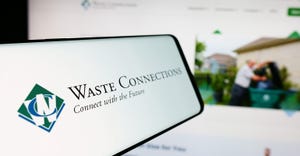Nebraska School Succeeds in Composting Most of its Food Waste
Sheridan Elementary students in Nebraska have consistently composted 90 percent of their cafeteria food waste since joining a pilot program in Lincoln Public Schools (LPS) on St. Patrick’s Day.
The food-motivated Sheridan “Sharks” have taken a big bite out of their daily trash by tossing an average of 150 pounds of leftover lunch waste into the green composting bin and sending only 18 pounds of garbage to the landfill, says Brittney Albin, sustainability coordinator at LPS.
“We knew after the first day that they were doing a fantastic job,” Albin says. The students have been taught that their actions in the lunchroom connect to high-level concepts such as reducing methane gas, reducing landfill waste and helping the environment. For example, she says most students choose to drink their milk without a straw so they have once less thing to throw in the garbage before heading out to recess.
Sheridan is the fifth school to join the district’s composting program, which launched with a three-week trial in May 2014. The feedback from that initial collection period was so positive in the three schools selected—one elementary, one middle school, and one high school—that the school district decided to use grant funding from Lincoln’s Solid Waste Department to expand to an additional nine elementary schools in 2015.
“As a district we have had a recycling program for more than 15 years but we were still sending over 4 million pounds of waste to the landfill each year from all of our buildings. Our schools have lunch every day so we decided to focus on lowering the amount of cafeteria waste,” Albin says. “We have 55 schools and more than 39,000 students who all have families and we have thousands of employees. We have a great opportunity to make a big impact on the community.”
Sheridan has the highest diversion rate in the district because the principal, teachers, kitchen staff and custodians have all taken extra steps to encourage students to think about what they are choosing for lunch, she says.
“At elementary school, they have a really preset menu but they do still have choices: I can take a banana or I can take this plastic container that has strawberries in it. Which one am I going to take?” Albin says. “It’s amazing and the students are really being problem solvers themselves and thinking ‘If I hadn’t taken this plastic mustard packet, everything on my tray could go in compost. Next time I’m not going to take that.’ We have heard things like that from all the students there and really thinking about way they can transform their lunch choices to put everything into compost.”
Through a partnership with Prairieland Dairy, which runs a commercial composting operation in nearby Firth, Neb., LPS has composted more than 115,000 pounds of cafeteria waste.
“This school program is a great way to start with the next generation,” says Jacob Hickey, manager at Prairieland Dairy, which has doubled its composting collections in the last six months. Organics from the schools, grocery stores and some industrial sites now tip the scales at nearly 1 million pounds a month. “You know it’s hard to teach old dogs new tricks.”
To that point, Albin admits food waste collection at the high school has been more challenging than at the elementary schools. There’s the teenage attitude of “why do we have to care about this?” coupled with the fact that there are more students—nearly 2,000—and cafeteria choices that come with more packaging since most of it is served a la carte.
“It’s more complicated for sorting and you have multiple waste stations that are not being monitored like at an elementary school where there is one waste station and the custodian is standing there observing,” she says. “Even though they are our lowest diversion rate, they are still diverting more than more than 60 percent of their food waste from the trash. They have composted more than 40,000 pounds this school year.”
Prairieland’s compost is used as an amendment to enhance the soil, make it healthier and eliminate the need to for fertilizer—all things that are critical to preserving the agricultural land of Nebraska.
“Agriculture is what our economy is built on,” Albin says. “That’s why composting our food waste is very important for our state.”
While commercial composting is in the early stages of development in Nebraska, Hickey says he hopes his state will someday see the organic and food waste bans gaining traction around the country.
“We hate to see all that waste going to the landfill when we know that 8o percent of that is compostable,” he says. “It could go to make something useful instead of a manmade hill.”
About the Author
You May Also Like


